
AASTMT actively promotes water security through research collaborations, educational programs, and public awareness campaigns. The institution engages in joint research projects with local and international partners to improve water resource management and tackle water security challenges. AASTMT also offers specialized training and academic programs focused on sustainable water use, equipping students and professionals with the knowledge and skills needed to address issues like water scarcity and pollution. Additionally, through seminars and workshops, AASTMT raises public awareness on the importance of water conservation, supporting global efforts aligned with SDG 6.
Sustainability in Water and Sanitation: AASTMT at EU–Egypt Conference
As part of promoting sustainability in water and sanitation services, the Arab Academy for Science, Technology and Maritime Transport (AASTMT) participated as a golden sponsor in the EU–Egypt Water Talks conference, “Sustainability of the National Industry in Water and Sanitation Services,” held February 26–27, 2024, in Alexandria.
The event, organized under the patronage of the Ministry of Housing and Urban Communities, the European Union Delegation in Cairo, and the Holding Company for Drinking Water and Sanitation, addressed key issues in water management, wastewater treatment, sanitation services, and sustainable water resources. AASTMT representatives highlighted initiatives in wastewater management, drinking water quality, groundwater protection, and desalination technologies, while also showcasing academic programs in education, training, and consulting to support water supply, pollution control, and resource management.
Sustainability in Water and Sanitation: AASTMT at EU–Egypt Conference on AASTMT webpage
Sustainability in Water and Sanitation: AASTMT at EU–Egypt Conference on AASTMT webpage
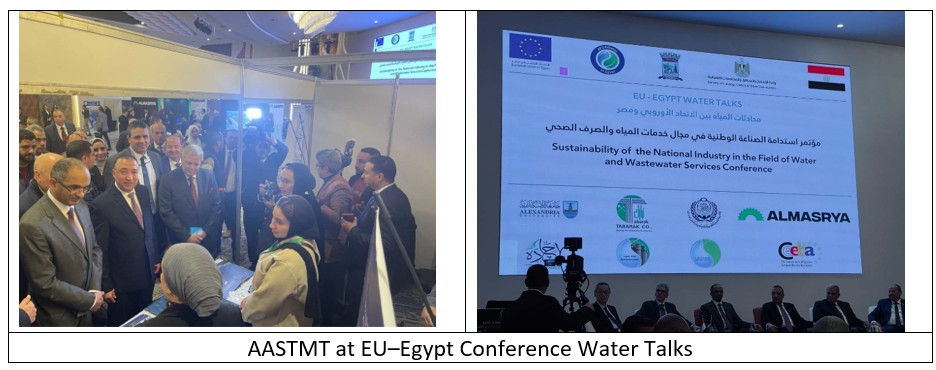
AquaVET — Knowledge Exchange in Aquatic Animals Medicine and Ecosystem Health in the Mediterranean and sub-Saharan Regions (2024- 2027)
The AquaVET is an Erasmus + project that addresses the growing challenges in aquaculture and aquatic veterinary medicine in Egypt and Nigeria by establishing an interdisciplinary MSc program in “Aquatic Animals Medicine and Ecosystem Health” (AQAMEH). The program aims to bridge the gap between aquaculture and veterinary sciences, ensuring a new generation of highly skilled
professionals. The Egyptian and Nigerian aquaculture sectors face major challenges, including:
AquaVET — Knowledge Exchange in Aquatic Animals Medicine and Ecosystem Health in the Mediterranean and sub-Saharan Regions (2024- 2027) on AASTMT webpage
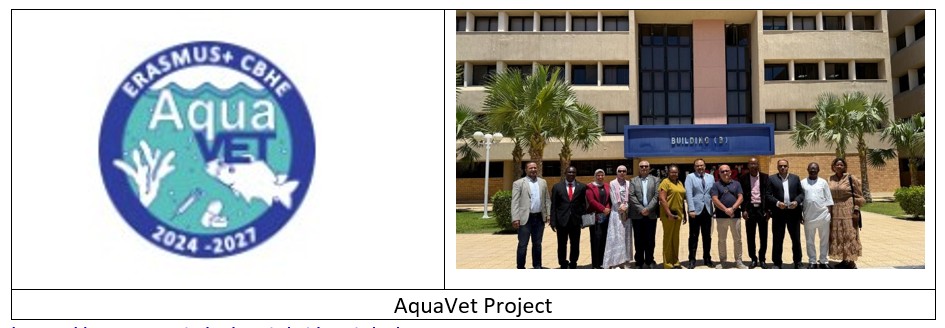
GEMS-TECH—Green Maritime Horizons: Collaborative Innovation in Ship Engineering and Sustainable Technologies (2024-2027)
The GEMS-TECH project aims to modernize maritime education in Egypt and Kenya by integrating sustainable maritime practices and green technologies into higher education. GEMS-TECH aims to develop new multidisciplinary modules, modernizing curricula, and introducing Massive Open Online Courses (MOOCs) on sustainable maritime solutions. This initiative aligns with UN SDGs, the EU’s Green Deal, and the International Maritime Organization (IMO) 2050 decarbonization strategy. The project will establish strong academia-industry partnerships, ensuring that students and professionals acquire both theoretical knowledge and practical skills. It will also facilitate collaboration between European, Egyptian, and Kenyan higher education institutions to create sustainable, high-impact learning outcomes. Project Objectives
GEMS-TECH—Green Maritime Horizons: Collaborative Innovation in Ship Engineering and Sustainable Technologies (2024-2027) on AASTMT webpage
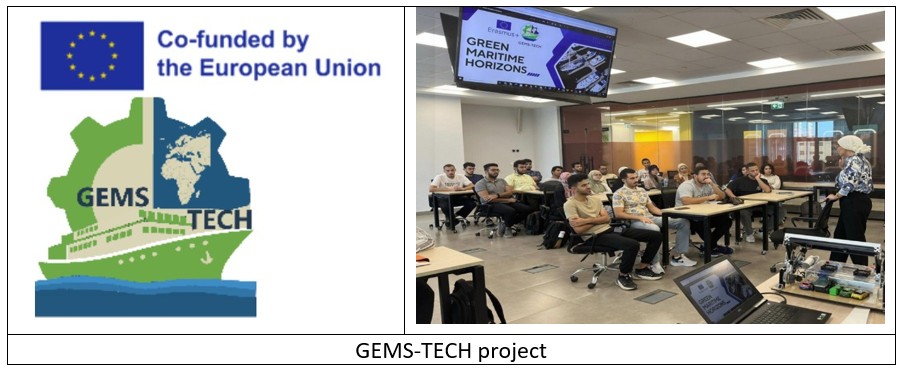
Updates for Mobilizing new Areas of Investments and Together Aiming to increase Quality of life for All MAIA TAQA Funded Project (2019- 2024)
The MAIA-TAQA (Mobilizing new Areas of Investments And Together Aiming to increase the Quality of life for All) project, funded by the EU under the ENI CBC Med Programme, promotes resource efficiency, renewable energy, wastewater treatment, and sustainable water management across the Mediterranean. With key partners including AASTMT (Egypt), CEEBA (Egypt), the Industrial Research Institute (Lebanon), and the Jordan Chamber of Commerce, the project has introduced innovative eco-friendly solutions to address regional sustainability challenges.
The AASTMT played a central role by hosting and supporting activities in Egypt, from piloting renewable energy at El-Ameria Market to launching the Innovation One-Stop-Shop, underlining its commitment to sustainability, energy efficiency, clean water, and resource management in the region.
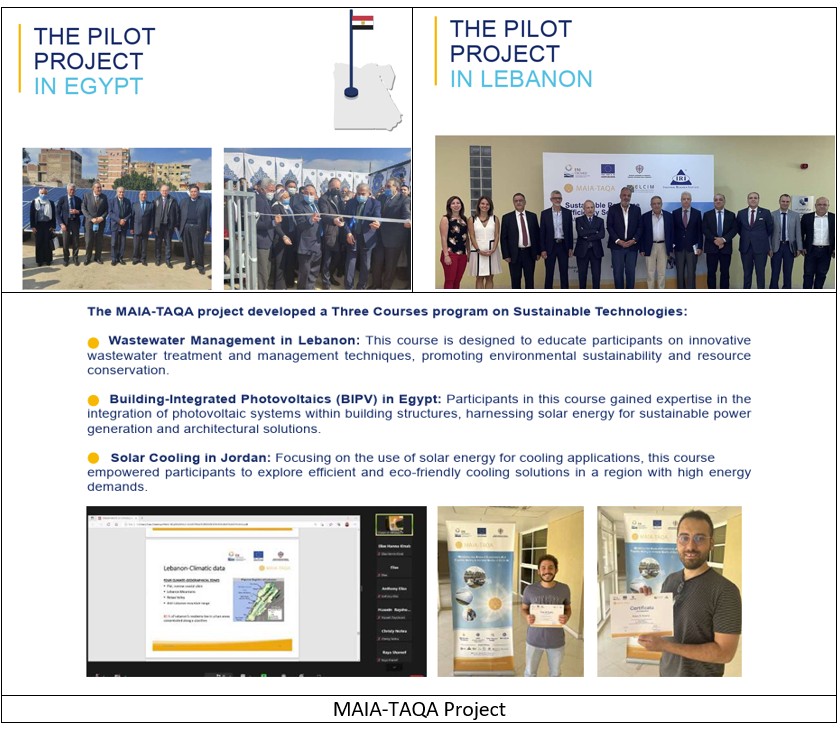
AASTMT Strengthens Climate Resilience and Water Sustainability in Coastal Cities through International Participation
The AASTMT participated in the International Workshop on Climate Change Risks in Coastal Cities, held in Alexandria, in collaboration with the Mediterranean Cities and Regions Authorities and the French Consulate.
AASTMT President Prof. Dr. Ismail Abdel Ghafar Ismail Farag highlighted the Academy’s long-standing commitment to marine research, climate adaptation, and sustainable water management. He emphasized the importance of resilient water infrastructure, stormwater drainage systems, and marine ecosystem protection as key measures to address climate impacts and ensure clean water and sanitation (SDG 6) in coastal regions. AASTMT researchers are currently working with Alexandria Governorate to develop an integrated climate adaptation plan that strengthens coastal protection and improves urban water systems. These joint efforts contribute to achieving sustainable water resource management and advancing Egypt’s Vision 2030 and the UN Sustainable Development Goals.
AASTMT Strengthens Climate Resilience and Water Sustainability in Coastal Cities through International Participation

AASTMT Promotes Water Resilience and Sustainable Infrastructure on Arab Day for Disaster Risk Reduction
The AASTMT hosted a workshop marking the Arab Day for Disaster Risk Reduction 2024, in collaboration with the League of Arab States – Housing, Water Resources, and Disaster Reduction Department. Held under the theme “Resilient and Disaster-Resistant Arab Infrastructure,” the event highlighted the importance of sustainable water resource management, flood resilience, and crisis preparedness to protect communities and support SDG 6.
AASTMT Promotes Water Resilience and Sustainable Infrastructure on Arab Day for Disaster Risk Reduction on AASTMT webpage
AASTMT Promotes Water Resilience and Sustainable Infrastructure on Arab Day for Disaster Risk Reduction on AASTMT webpage

Promoting Sustainable Water Use through Smart Agriculture: AASTMT’s Role in the InovFarmer.MED Project
The InovFarmer.MED project, co-funded by the PRIMA Programme, aims to enhance the sustainability of Mediterranean agri-food value chains through digital innovation and eco-friendly practices. Within this framework, the Arab Academy for Science, Technology and Maritime Transport (AASTMT) plays a key role in developing smart farming tools and training programs that promote efficient water use and sustainable resource management among small-scale farmers. By integrating IoT-based monitoring and data-driven irrigation systems, AASTMT supports the reduction of water waste and pollution, contributing directly to SDG 6 (Clean Water and Sanitation) — particularly targets 6.3 (improving water quality) and 6.4 (increasing water-use efficiency).
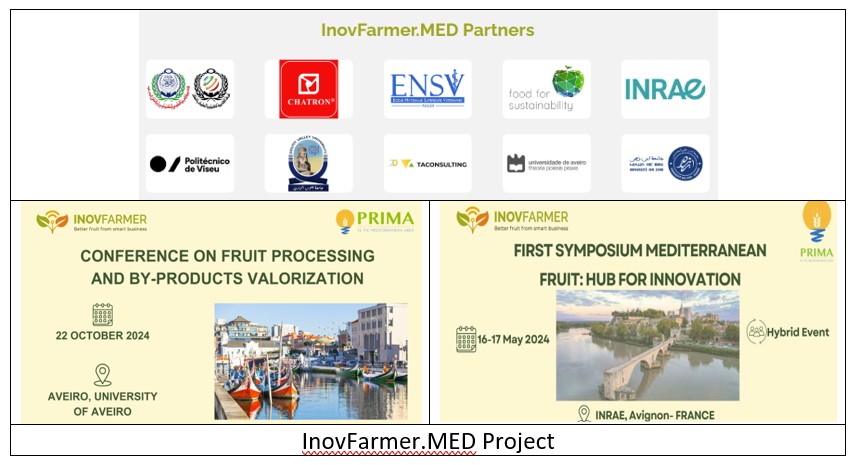
Participation of AASTMT in the 5th Arab Water Conference and the 15th session of the Arab Ministerial Water Council
AASTMT participated in the 5th Arab Water Conference and the 15th session of the Arab Ministerial Water Council in Riyadh on November 22, 2023. The events focused on sustainable development in the Arab region, particularly SDG 6, addressing water security challenges, opportunities, and the execution of the water security strategy. Discussions emphasized strengthening Arab cooperation in managing shared water resources and ensuring sustainable water development aligned with the 2030 Agenda.
.png)
AASTMT Partners with German Companies in Water Treatment and Wastewater Management
Participation of The College of Engineering and Technology in the WATER SECTOR: Matchmaking event of Egyptian and German companies congress. Dr. Mohamed Khamis attended the congress to explore potential partnerships in the environmental and water treatment fields. The event aimed to introduce German companies to the Egyptian market for environmental services and water management. This aligns with SDG 6, focusing on clean water access, pollution reduction, and wastewater treatment. Discussions also included training opportunities for engineering students with German companies.
https://chemonicsegypt.com/news/8922/invitation-to-matchmaking-event/
.png)
AASTMT Participates in the World Environment Day celebration under the theme 'Finding Solutions to Plastic Pollution’:
AASTMT participated in the World Environment Day 2023, which aims to reduce plastic pollution and promote sustainable practices. AASTMT was honored as it played a crucial role by collaborating on the Toumali project, aiming to reduce marine waste generated by the tourism sector and addressing marine pollution, enhancing water quality, and fostering sustainable waste management practices. The project is funded by Federal Ministry for the Environment, Nature Conservation, Nuclear Safety and Consumer Protection in Germany with 9 consortium partners.
https://akhbarelyom.com/news/newdetails/4111190/1/%D9%88%D8%B2%D9%8A%D8%B1%D8%A9-%D8%A7%D9%84%D8%A8%D9%8A%D8%A6%D8%A9-%D8%AA%D8%B4%D8%A7%D8%B1%D9%83-%D9%81%D9%8A-%D8%A7%D8%AD%D8%AA%D9%81%D8%A7%D9%84%D9%8A%D8%A9-%D9%8A%D9%88%D9%85-%D8%A7%D9%84%D8%A8%D9%8A%D8%A6
.png)
Egypt Enhances Transport Collaboration: AASTMT’s Role in Promoting Sustainability
During the 35th session of the Arab Transport Ministers Council, Egypt's Minister of Transport emphasized the country's commitment to enhancing cooperation in transport with Arab nations, highlighting the sector's vital role in economic and social development. The minister also acknowledged AASTMT’s contributions to advancing sustainable development through education and technology, reflecting SDG 6 by promoting sustainable practices, including infrastructure improvements and projects supporting environmental goals, such as reducing carbon emissions and enhancing transport efficiency, aligned with broader sustainable development objectives.
https://www.masrawy.com/news/news_egypt/details/2022/11/22/2328018/%D8%A7%D9%84%D8%AF%D9%88%D8%B1%D8%A9-35-%D9%84%D9%80-%D9%88%D8%B2%D8%B1%D8%A7%D8%A1-%D8%A7%D9%84%D9%86%D9%82%D9%84-%D8%A7%D9%84%D8%B9%D8%B1%D8%A8-%D9%83%D8%A7%D9%85%D9%84-%D8%A7%D9%84%D9%88%D8%B2%D9%8A%D8%B1-%D9%86%D8%AA%D8%A8%D8%B9-%D8%B3%D9%8A%D8%A7%D8%B3%D8%A9-%D8%B4%D8%A7%D9%85%D9%84%D8%A9-%D9%84%D8%B1%D8%A8%D8%B7-%D9%85%D8%B5%D8%B1-%D8%A8%D9%85%D8%AD%D9%8A%D8%B7%D9%87%D8%A7-%D8%A7%D9%84%D8%A5%D9%82%D9%84%D9%8A%D9%85%D9%8A-%D9%88%D8%A7%D9%84%D8%AF%D9%88%D9%84%D9%8A
.png)
The Community Service & Environmental Development Council reviews Rainwater Management Strategy Project with AASTMT and Alexandria University
The Community Service and Environmental Development Council's review of the rainwater management strategy emphasizes the importance of water management and addresses issues such as water scarcity and water pollution. The strategy integrates sustainable practices like rainwater harvesting and stormwater management to mitigate contaminated water risks, enhance water quality, and ensure efficient water treatment processes. The project is a collaboration with AAST, Alexandria University and local government bodies, such that the plan focuses on improving sewage treatment systems and utilizing advanced wastewater treatment techniques to support irrigation and groundwater restoration efforts.
https://alexu.edu.eg/index.php/%D8%A3%D8%AD%D8%AF%D8%AB-%D8%A7%D9%84%D8%A3%D8%AE%D8%A8%D8%A7%D8%B1/8271-%D9%85%D8%AC%D9%84%D8%B3-%D8%AE%D8%AF%D9%85%D8%A9-%D8%A7%D9%84%D9%85%D8%AC%D8%AA%D9%85%D8%B9-%D9%88%D8%AA%D9%86%D9%85%D9%8A%D8%A9-%D8%A7%D9%84%D8%A8%D9%8A%D8%A6%D8%A9-%D9%8A%D8%B3%D8%AA%D8%B9%D8%B1%D8%B6-%D9%85%D8%B4%D8%B1%D9%88%D8%B9-%D8%A7%D8%B3%D8%AA%D8%B1%D8%A7%D8%AA%D9%8A%D8%AC%D9%8A%D8%A9-%D8%A5%D8%AF%D8%A7%D8%B1%D8%A9-%D9%85%D9%8A%D8%A7%D9%87-%D8%A7%D9%84%D8%A7%D9%85%D8%B7%D8%A7%D8%B1
A Scientific Protocol between the Alexandria Drinking Water Company and the Arab Academy for Science and Technology (2022)
The collaboration between Alexandria Water Company and AAST focuses on advancing water resource management, particularly addressing challenges in wastewater treatment and water quality. Key initiatives include improving sewage treatment infrastructure, implementing stormwater and rainwater harvesting systems, and ensuring the sustainable use of groundwater. The partnership also promotes effluent management, enhancing water productivity while reducing water pollution. These efforts contribute to safeguarding drinking water supplies and ensuring water sanitation, thereby addressing critical issues of water scarcity in the region.
.png)
The MAIA-TAQA (Mobilizing new Areas of Investments And Together Aiming to increase the Quality of life for All) project is EU funded with a total funding to 200,865 Euro focusing on promoting resource efficiency and renewable energy solutions in the Mediterranean region. The project emphasizes sustainable energy, wastewater treatment, and resource management. Key partners include AASTMT (Egypt), CEEBA (Egypt), Industrial Research Institute (Lebanon), Jordan Chamber of Commerce, and other regional stakeholders. Funded under the ENI CBC Med Programme, the project aims to foster collaboration and implement innovative, eco-friendly technologies to support regional sustainability efforts.
The AASTMT played a crucial role in the MAIA-TAQA project, particularly in Egypt, where it hosted and supported the implementation of renewable energy solutions. AASTMT organized key activities, including launching the Innovation One-Stop-Shop (IOSS) to promote resource efficiency services. AASTMT also facilitated pilot projects like the 100 kWp photovoltaic system at El-Ameria Wholesale Market, demonstrating the institution's commitment to advancing sustainability, energy efficiency, and clean water solutions
For the full report of the project:
.png)
The MED-QUAD (MEDiterranean QUadruple helix Approach to Digitalisation) is an EU funded project with a total cost of 3.2 million Euros aiming to address the innovation and growth challenges faced by micro enterprises in Mediterranean regions by fostering cooperation among universities in six countries. During the project duration, the partners conducted four scientific research projects with cross-border cooperation:
An update of the project in 2022-2023 was the achievement of Smart Water Use Applications (SWUAP) Living Lab. The SWUAP Living Lab focuses on:
Mediterranean Quadruple Helix Approach to Digitalization Funded Project (2020- present) on ENICBCMED page
.png)
The Arab Academy for Science, Technology, and Maritime Transport (AASTMT) participated in COP 28 to showcase its commitment to environmental sustainability and innovation. AASTMT focused on promoting research and technological solutions that contribute to global climate action, particularly in areas like water management and renewable energy. The institution's involvement in international discussions aimed to highlight the importance of integrating academic expertise with practical applications to combat climate change.
https://aast.edu/en/news/news-details.php?language=1&unit_id=1&news_id=486101604&event_type_id=1
https://aast.edu/ar/events/event-details.php?language=1&view=1&unit_id=1&event_id=1687&event_type_id=1
.png)
Update for Trace & Trust Hubs for Med Food Project (2020-2023)
The Med Food TTHubs project (Trace & Trust Hubs for MED food), launched in 2020, focuses on enhancing transparency, traceability, and authenticity in the agri-food supply chain across the Mediterranean region, aligning with SDG 6 by addressing sustainable agricultural practices and water management.
In the Med Food TTHubs project, AASTMT contributed significantly to promoting sustainable water management practices, aligning with the goals of SDG 6. AASTMT’s involvement included working on traceability systems for processed vegetables, with a focus on ensuring efficient water use throughout the agricultural process. By implementing blockchain technology for water resource monitoring and transparent tracking, AASTMT supported the sustainable consumption and management of water. Their efforts helped reduce water waste and enhance the efficiency of agricultural practices, contributing to clean water and sustainable water use in the Mediterranean agri-food sector.
Trace & Trust Hubs for Med Food (2020-2023) on TThubs page
Trace & Trust Hubs for Med Food (2020-2023) on AASTMT page
.png)
The AASTMT welcomed a Chinese delegation led by Mr. Zhang Hua Sheng, the Science and Technology Advisor at the Chinese Embassy in Cairo and the meeting focused on potential cooperation in areas like artificial intelligence, satellite navigation, smart technology, and IoT applications for agriculture, fish farming, and water conservation. The visit reinforced the ongoing partnership established through the China-Arab Technology Transfer Center, created following the 2015 China-Arab Expo agreement.
.png)
The AASTMT Faculty of Pharmacy participated in the 5th Arab Water Conference in Riyadh, Saudi Arabia, from November 22-23, 2023. Dr. Miran Ahmed Hajar, from the AASTMT's research center, presented a paper on the "Effective Role of Plants in Water Recycling for Environmental Sustainability and Enhancing the Circular Economy." Professor Amira Mustafa Sunbul, Dean of the Faculty of Pharmacy, expressed gratitude to the Academy’s president for his support and to the conference organizers for their efforts.
.png)
Local & Regional Cooperation: (2021-2022)
The AASTMT often collaborates with local and regional authorities in various ways to address water security challenges:

AASTMT collaborates internationally for water security through various avenues:

